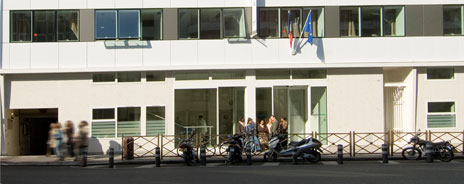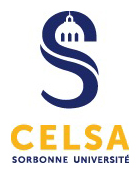

Votre parcours: Accueil > CELSA

CELSA, a school of reference in the information and communication sciences
A Graduate School within the University of Paris Sorbonne, CELSA offers degree programmes in Journalism, Communication, Marketing-Advertising, digital communication and Human Resources. It awards the following degrees : Licence, Professional Master, research Master, Doctorate, Magistere and MBA. Degree programmes are offered to students enrolled in initial and adult education.
Applying the values of humanism and performance
CELSA has applied its founding values of humanism and performance to its diverse fields of activities.
The boards and pilot committees of each department conduct forecasts by speciality, and evaluate programmes in order to constantly update them. Those participating in school life undertake to adhere to the principles in the internal regulations which require regular attendance, punctuality, confidentiality, trust and rigour.
Innovative teaching: from knowledge to know-how
CELSA has pioneered interactive teaching since its creation.
The trademark of the school is its foothold in the academic and professional world, its pedagogical supervision and intensive tutoring, alternation between teaching and internships, an active international policy and the insertion of its graduates.
Academics and professionals on the teaching staff
Because both theory and practice are necessary to train efficient, versatile and reflective executives, the synergy between academics and professionals is a strength of the School
Teaching is done by academics and a majority of working professionals, who are included in programme development and school life. Outside contributors are chosen for their professional and teaching skills plus a desire to involve themselves in the daily life of the School and the students. This duality produces graduates in tune with the economic and social realities and endowed with the critical distance needed for professional advancement.
A demanding follow-up of students
The competitive entrance exam attracts candidates from diverse backgrounds (literature, sciences, preparatory classes, foreign students).
The 800 students at the School prepare careers in corporate communication, marketing-advertising, human resource management, journalism, digital communicationand intercultural management.
Each promotion has on average 25 students each receiving an education which is demanding and tailored to their development.
Theory plus professionalism to understand and improve action
Initial and adult education programmes alternate theory, professional practice, case studies, internships and applied research to give students the fundamentals in social sciences and information and communication theory, as they specialise more and more in one of the majors offered.
The School awards university degrees: the Licence, Professional Masters and Doctorate, and three university diplomas: the Magistère in Communication, the MBA 'Management, Communication and Societies' and the University Diploma in 'Societies, Cultures and Professional Practices' (or gap year programme).
Corporate and Institutional Communication
This covers the field of the policies and issues linked to the reputation, visibility and image of organisations among their internal and external publics.
The teaching highlights suitable strategies for different audiences like staff, shareholders and clients, and opinion relays like journalists, elected representatives and public bodies
Digital communication and media
The objective of the course is to train versatile practitioners fully aware of the current transformations the media are undergoing, plus the changes to the economy, society and professional practice this entails. Their expertise in the media combines with a broad knowledge of communication, marketing and human resources.
Marketing, advertising and communication
The Marketing, Advertising and Communication course offers the theory essential to information and communication, semiotics and consumer sociology plus up-to-date professional practice.
Students need to acquire the analytical methods needed to nuance their understanding of the questions which will likely arise in their future professions.
Human resources and communication
In a socio-economic environment in continual change, CELSA has chosen to ally human resources and communication, to reconcile human and professional development within firms with necessary market performance criteria. The option offers job opportunities in human resource management positions which place importance on team-building, innovation and experimentation and the implementation of organisational and technical change.
Journalism
The journalism course was founded in 1979 and was accredited by the profession in 1981.
The school has made the choice of a generalist training which develops cultural, critical and professional skills, preparing students for careers in the written press as well as in television, radio and multimedia with a final-year major.
Magistere in communication
The course received accreditation in 1986 and students are awarded a Professional or Research Master's degree and the Magistere diploma.
The course is generalist in communication strategy but specialist in terms of communication activity, and focuses on the analysis, conception and monitoring of communication strategy. It offers thorough training in the social and human sciences and their professional application to the broadest issues in corporate and institutional communication.
A network of international relations
Since its inception, the School's policy has been to remain open to the international environment. Issues related to theory and practice of communication at an international level are a core part of the teaching, and part of the programme is taught by visiting professors. The School has given priority to teaching and student exchanges as well as language training for the professional world
Fostering student mobility
The school encourages students to do a semester of studies or internship abroad (Europe, Asia, North and South America, Africa and Australia).
They may also choose to study or work abroad on the School's gap year programme and thus obtain the University Diploma in 'Societies, Cultures and Professional Practices'
A School community
Via its Student Association, student-run Business Consultancy and Alumni Association, CELSA encourages community life.
Student associations organise various events such as the integration week-end for new students, job fairs, lectures, student reunions and graduation ceremonies, all of which increase the visibility of CELSA.
Ongoing interaction with business
With the help of its governing body composed of outside personalities chosen for their involvement in the School, the CELSA has regular close contact with the business and social environment at all levels of its activity.
CELSA actively strengthens its ties to a network of over 2000 firms of all sizes and in all sectors of activity so as to maximise the employment and career prospects of its graduates. The internship office plays a key role in helping students and firms in their search.
An observatory to monitor the professional world
The observatory monitors the evolution in professions linked to the information and communication sectors, counsels students individually and monitors their career paths. Its results are published regularly and used to update programmes. CELSA graduates work in all sectors of information and communication, as executives in strategic or operational management, in a wide variety of institutions and corporations in the private and public sectors. Their insertion into professional life is rapid and their ability to anticipate and evolve is recognised
Key data
An average class size of 25 students
1 to 3 years of study according to the option chosen
Over 450 professionals and outside teachers
Over 7000 job and internship offers each year
80% of students in employment three months after graduating
An alumni association with a membership of over 800








